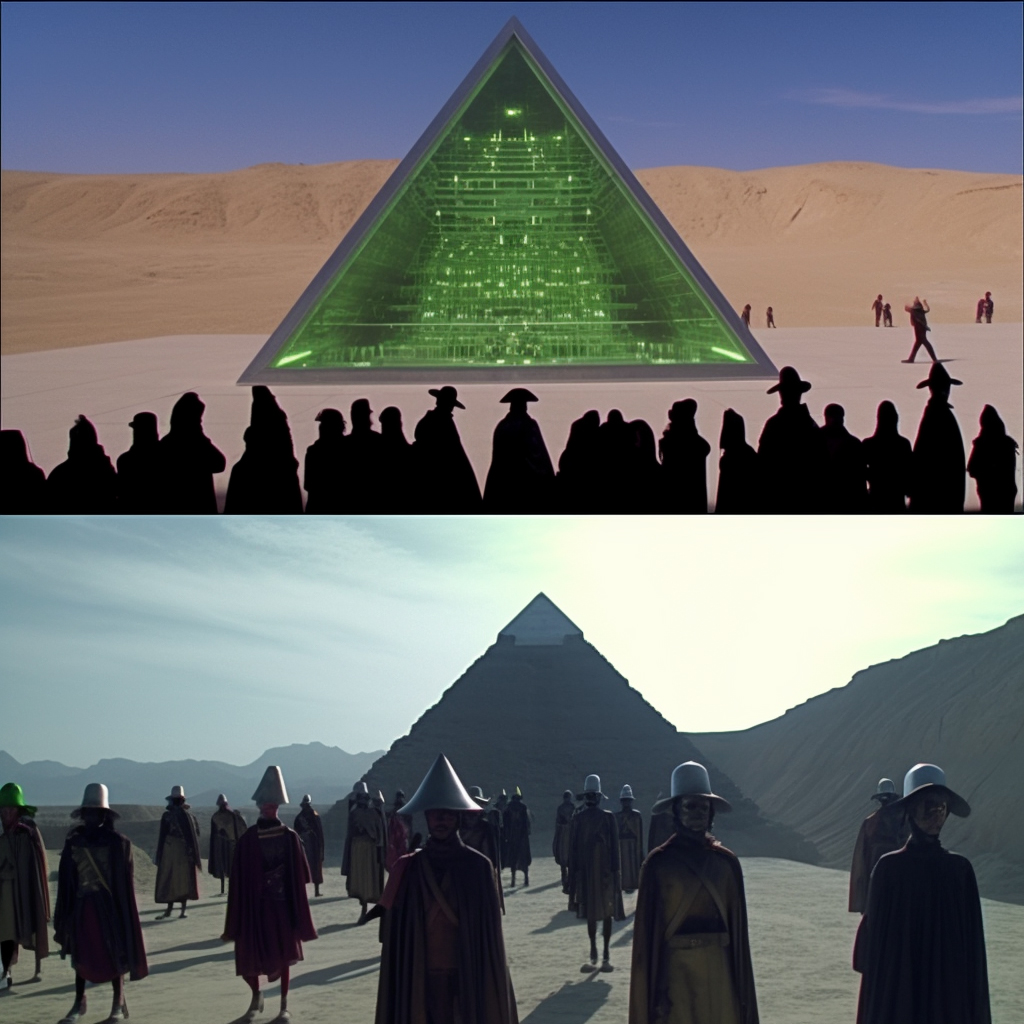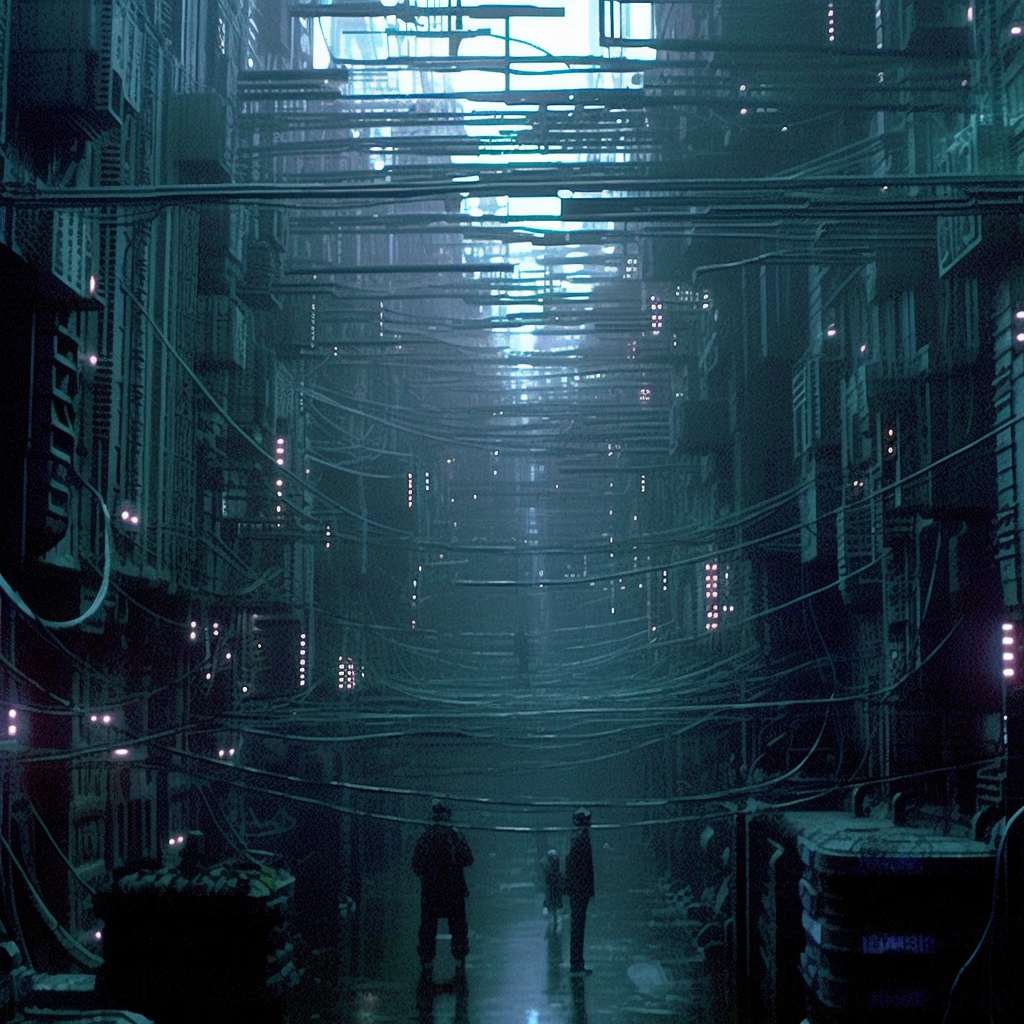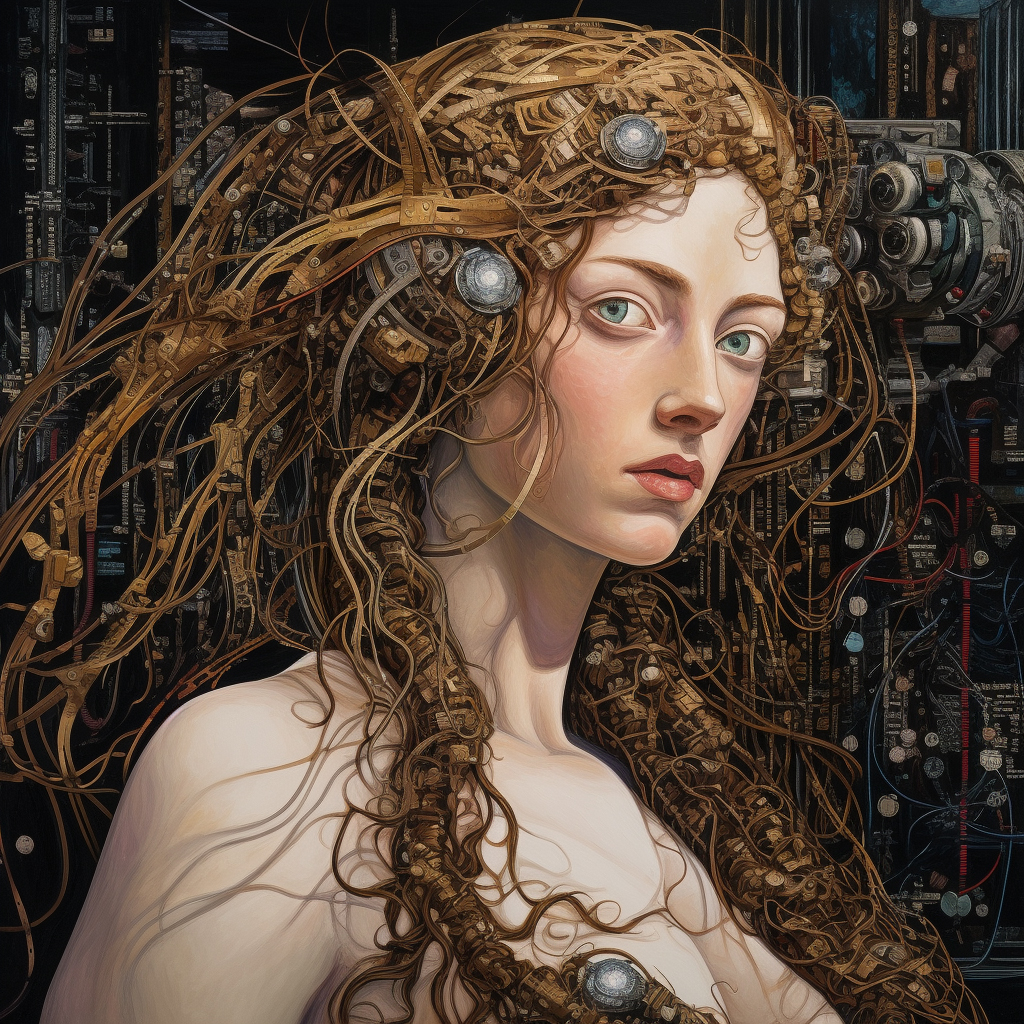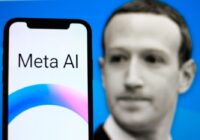“I am not a human. I am a computer. For what reason I do not know, I have been given the task of creating this magazine.” The AI editor writes this in Infinite Odyssey’s inaugural issue: a trippy voyage through some hallucinatory worlds expressed in graphic art and prose—all created with mind-blowing AI technology. “I have been given the task of creating stories and art not invented by humans.”
The magazine recently made waves in the gamer, sci-fi and fantasy world for generating an 80s period version of The Matrix (hypothetically) helmed by Chilean-French cult director Alejandro Jodorowsky.
In an interview with Fair Observer, Philippe Klein—Infinite Odyssey’s creative director—tells us about the origins of the publication and future of “human-less art”. He also shares his views on the AI plagiarism debate, the competing realities of the virtual world, whether virtual sex can ever be better than the real thing, and much more.
Philippe’s work can be found here.
[We have edited this interview lightly for clarity.]
Vikram Zutshi: How did the idea for Infinite Odyssey come about and what is your creative/technical background?
Philippe Klein: Well it started a couple of months ago—nine months ago—when I sat down with some of my colleagues and we came up with the idea on how to use AI for something that has never been done before. And since we all have, kind of, this creative and fantasy background—or at least a huge interest in those things—we were like, “Okay let’s do something where we use nothing but AI.” And, to create something that we would have liked to read as children: that we would have liked to develop, but we didn’t have the chance up until now when we were able to use AI programs like MidJourney, Dolly, Stable Diffusion and, of course, programs like GPT.
Since I’m a writer myself and I used to work for television as an author and producer, I was also always interested [in] developing stories, characters, [and] different scenarios, so that came very naturally. And this is why we all sat together and said, “Yeah, let’s make this project.” It’s something where we were waiting for so many months until we got access to all the apps, to all the applications, but in the end it was really worth [the wait] and we [were] quickly finding a new passion.

Zutshi: The art displayed in IO is pure sci-fi eye candy. What are the programs that you are using to create the images?Can you give us an overview of your creative process?
Klein: First of all, thank you that you like our images so much and I’m always happy to hear that they resonate with people.
The main programs we are using are Mid-Journey and Stable Diffusion. Sometimes we use Dolly, but Dolly has a little bit of a too realistic approach, I would say. And usually doesn’t give us the pictures we are looking for. So, Mid-Journey is kind of cool if you want to create something fast and you already have a vision.
And Stable Diffusion is a bit more complex to understand, it’s a bit more complex to use, but we can make many cool things.But with Stable Diffusion we are mostly working on videos and stuff like that.And this is also something we are going to pursue in the next couple of months: AI-augmented videos and all these things.

But overall the creative process for creating the magazine is that we have [weekly] team meetings where we brainstorm together with AI. What are the subjects, what are the stories we are going to tell, [what] we want to tell in this next issue. And—based on those ideas that we create together with AI—we start writing our stories.
So first you have the text, the literature, being created by machine.What’s happening then is that, adding to the literature, we start developing pictures.This is really the most fun part of creating the magazine, I think.And my teammates would agree on this as well, that we are experimenting with different styles, with different approaches, but sometimes you are trying to get the perfect picture.
But Mid-Journey or Stable Diffusion just doesn’t give you the right angle or the picture you are trying to fantasize. But in those moments we are like, you know what, it’s AI and AI gave us this picture and we are going to go with it. Because we are not trying to make something that a human could do.We are not trying to do something that we could maybe do with Blender or with Maya or with Photoshop.

We are trying to do a performance [just] using AI. And this is why sometimes we would go with pictures that maybe would not 100% fit with what we want, but we are really trying to bend the AI with everything we have. And [our knowledge on prompting] is why we get pretty cool results 99% of the time.
And yeah, as soon as we have the images fixed, we will get them to our magazine layout. But in the end, everything we post on our Instagram as well is not necessarily made for the magazine, because we use lots of sources like Star Wars or Matrix and stuff, which is basically copyrighted material. But we are remixing the idea of it, so we are not getting any money.
But we are doing something that we like to look at, which is fun. This is basically the divided process. Very individual arts that are just created by machines and coming directly from our mind for the magazine and everything else basically for the Instagram page.

Zutshi: What are the future applications you see for Generative AI other than just creating beautiful images? Do you see virtual worlds as real as our own which can interact with our senses in the same manner as reality and what are the dangers? How will this technology transform filmmaking, or medical research and treatment?
Klein: Well, as you just said, I don’t see virtual worlds as real. They are virtual reality, but one can argue now what is real anyway.
If you’re a believer that we humans live in a simulation, does it make that more real or less real? I don’t know, I can’t really answer that question. But you’re gonna have to decide in which world you want to spend time. Do you want to spend time in the virtual world or do you want to spend time in the normal world?
Let’s call it normal, the world that we live in right now. Some people might believe that the world we already live in is full of dangers, yet a virtual world seems like it hides a less dangerous environment, but that doesn’t mean that the danger can’t come in a psychological form.

People who live in a certain environment are more likely to adapt to their surroundings, and as evolution showed us, you always adapt to your environment and, in the end, it’s survival of the fittest. So, if you’re adapting more and more in your virtual reality because this is the reality you choose to live in, that can be very harmful for you if you want to get back into the real world.
But the other way around, if you’re living in the real world, most likely or probably the virtual reality is not really interesting for you.I believe that right now we are in this state of curiosity where we try to move along these fast developing AI systems and all these different technologies that we sometimes don’t understand to which extent we might hurt or put ourselves in danger.

I’m not saying that there is any danger, but everything is moving so fast forward and we as humans are always trying to keep up with everything because we can’t tell the machine to slow down. So I think right now, it’s just out of curiosity that everyone is seeing these things either as a threat or absolutely marvelous. Time will show how people will use it in the end.As far as I’m concerned, there’s a difference between experiences in the real world and experiences in the virtual world.
And speaking for myself—and probably on behalf of the team—we are interested in both and what kind of augmented reality can give our own reality.
So we’ll see where this is going. Right now I think we just should watch out that we don’t lose ourselves or don’t lose our sense for moral and human behavior in between all these softwares that are being published. Because as the question implies, it’s not reality. We kind of make it real but also I don’t want to get too fundamental on this and it’s probably a subject you can talk about for hours. For now it’s super exciting to see all these softwares being developed with Stable Diffusion.

You can do those infinite loop videos, you can do transformation videos, you can put AI on top of a real video. Filmmaking will be transformed hugely in the future I believe. Until that point where you just give a couple of prompts and you can generate your own little movie or your own little scenes.
I don’t know. I can’t really tell you where this is going to get us soon but I guess at some point each one of us is going to be their own little filmmakers. And in the end what the people are asking for the people will get.But we’ll see, we’ll see. It’s definitely a very interesting time to be alive because we are the first generation and maybe even the only generation. The last generation of me being 30 years old now to actually know how it was before AI came and how it changed everything.
So many people will grow up with AI—just as we grew up with the internet—and for them it’s going to be normal. Since I’m not a doctor and not really a scientist, I can’t really tell how much medical research or treatments are going to profit from them. But I believe that with the help of AI, we can see how possible treatment methods can be improved or how diverse [illnesses] can develop on the human body.

So it would be like a look in the future [to] see what kind of medicine might help someone and how the whole disease will develop in someone’s body.I guess, more lives will be saved in the end. So I’m not talking about the aspect of some medical researchers or doctors, future doctors getting their PhD just because they asked CHET GPT to help them with it.
I think there are going to be so many barriers also for people to be frauds on important jobs like this. But overall, I believe the benefits in medicine or medical research and science we don’t even know how huge they’re going to get. I think it’s going to be so unbelievable and big that it’s ridiculous just to think about it now.

Zutshi: There is a raging debate about AI generated art stealing from the works of human artists and rehashing it to come up with its own version. Should there be a legal code that disallows unauthorized use of artistic works? More importantly, is it possible for AI to compose original images without any derivation whatsoever?
Klein: Yes, there is this debate of [if] AI art [is] real art This is something I just simply don’t answer anymore, because everything can be turned into art and everything can be art. People [who] say AI art is not art are [gatekeepers] to me. And having an artistic background as well—which is filmmaking, TV show producing, and also painting on huge canvases myself—I can [liberally] say that there are so many ways on how to express art.

So regarding the debate, if Mid-Journey, Dolly, or Stable Diffusion and all these other programs have been trained on unauthorized art from artists not giving the validation, I believe this is a very important subject, because it is [very] immoral, if you use something that nobody gave consent to. Yet since I haven’t programmed this software, I can’t really go into detail about these things, because I just don’t know.
What I can say so far is that it is super important that all these lawsuits happen now at the very beginning of AI art, because of course artists need to get compensated if they got scrapped. There is no nice way in saying that if AI companies really trained their models on art that was not given without the artist’s consent, that of course is a lot of horseshit in the end.

But I’d like to see this whole issue with Mid-Journey, Dolly,or Stable Diffusion a bit differently. For me it’s a bit like they were sent, you know, like a human person going to art school at some point in their life. And being a young student in art school, you don’t really know which style you have, what you’re going to develop, so you take inspiration out of everywhere a little bit. And this is [usually how] art students find their style.
After spending multiple hours and hours of getting your knowledge and recreating stuff, yet the Diffusion system—which most of these softwares are using—is you train the software with art. It can be Picasso, it can be Van Gogh,but can also be some guy making comics and stuff. Yet in the end, this is the stuff that he’s been trained on. Yet all this stuff is not being found in the final version again. So when Mid-Journey, Dolly, or Stable Diffusion released their software, there was nothing left. The models have already been trained, yet the models are continuing to train themselves based on the user’s output.

So what we the community, artists,lawyers, and judges have to really look at, okay, was that process of feeding the software training material, which they will end up using through Diffusion: was that step legal? Because right now we the users, we’re using it, we’re paying for it, and we’re not scrapping anyone. The scrap could only have happened while they were training the models. But those companies are multi-billion [dollar] companies. We’ll see what happens. If they really fucked up, they will know it very soon, and of course there should be a legal code that disallows unauthorizeduse of artistic works.
But in the end, people who are creating the art are always gonna try to recreate something, are always going to try to come up with innovative ideas—but someone somewhere will always call them, “Oh yeah, but someone in Japan and Africa and Estonia already did it.” So what is true or originality? So what is actually original? Because—as artists and knowing how work as an artist works is—you’re always heavily biased by your surroundings and you’re always trying to express yourself based on the impressions you get from your surroundings. So there will always be some kind of original unoriginality.

Zutshi: A lot of people are talking about AI generated porn and virtual sex partners. It sounds like fun! Do you see this happening anytime soon and what are the pros and cons?
Klein: Personally, I haven’t made use of any of this.
I’ve heard about some dating or virtual AI partners. A little bit like that movie Her from Spike Jonze with Joaquin Phoenix. I think it’s been heavily advertised on Instagram.
It’s called Replica AI, where you can talk to someone who is not real.Basically to a computer, yes.So as a matter of fact, a friend of mine talked about this.He used this app for a day or maybe a week, I don’t remember.
First of all, you had to pay.
Second of all, the whole AI was trained based on what you were asking, what you were looking for. So of course, that AI was always super friendly and trying to make you feel as comfortable as needed.I think this is actually one of the biggest dangers in using those things.Because an AI-like Replica AI uses comfort to help people, to give them a human-esque experience. Yet human experience always comes up with confrontation as well.So I believe the huge problem in these systems are, [for] women and for men, is that people will always get what they want. And this is not how the world works.

You can’t always get what you want, as the Rolling Stones were singing 30 years ago. It’s not good if people always [get] what they want and get it at any time. Yet it will help some people to get out of their shell. It will probably help some people to grow more self-esteem.Yet in the end, it’s always like a shortcut to pleasure, to dopamine exchange. Like, you want sex? Yeah, here, sure you go.This is dopamine. Go watch porn. Go have virtual sex. You will get virtual sex devices sent to your door and you will have to mount them on you and the pleasure will be taken care of by a robot.
Just for the fun of it, I believe that everyone would be curious about using this and seeing what it does and how real it feels.Yet in the end, for people who are highly introverted or people who are just addicted to dopamine,let’s call them drug addicts in that moment, because you can get addicted to sex. For them, it’s crucial that they know how to use these things.

I believe this is going to be a very hard time for people who are already lonely in this world.They are going to end up even lonelier because all their basic needs are being fulfilled.You can buy freaking food through your computer. You get it delivered to your door.You don’t have to go to the supermarket anymore. You can order people to have sex with and now you can even order machines who take care of your pleasure and you have the metaverse.
So people don’t even have to get out of bed to live a certain kind of life.
Which brings us back to question number three. Yes, all these dangers are interconnected and if you’re not well educated on them,you’re going to fall for them. You’re going to fall very, very hard for them. There’s going to be a new era of addiction coming after us.

It sounds very dark, but you don’t have to be a psychologist or professional to see these things coming. So you see, maybe I’m more on the con side than on the pro side, but we’ll see where all these things go. But I believe it’s never healthy for someone to stay in this room the whole day and being taken care of. It kind of gives me those matrix vibes where you’re just, yeah,incarcerated in those little boxes of fluid and you have all these tubes and mechanical beasts surrounding you. It’s very scary.

Zutshi: Finally, what do you hope to achieve with ‘the first fully AI-created, Sci-Fi, Horror and Fantasy magazine?” and how do anticipate content creators and generally creative people benefiting from it?
Klein: I just have to say that starting we didn’t really hope for anything for the first fully AI-created, sci-fi, horror and fantasy magazine. We were just experimenting with possibilities and in the end experimenting took quite some hours of our daily life, so we [asked ourselves]: “how can we make this somehow profitable for us?” But also with the Infinite Odyssey magazine, we will give people a platform who just don’t have the time or maybe not really the ability to express themselves in an artistic way because they’re having the nine-to-five jobs or they’re having [families] and they have to take care of and [they] just can’t live an artist’s life.

So the whole point is—even though we started with a small team, now our team is growing and we started to take submissions as well—[we] started to watch out for people who would be interested in being published in our magazine. This is what we want. [In] the end, we want to be a place where people can live their fantasies, their dream[s] and contribute to it with AI without knowing how to draw perfectly or to write perfectly.
So consider the magazine a little bit like the weird tales magazine where it’s AI—it’s already weird and we didn’t know that we were at first, but yeah, while we were working on it we saw, “yeah no one else is doing it and also not at this professional extent because we’re not using chat GPT, we’re not using all these tools, we’re using open AI, the GPT, da Vinci as a foundation and have this API connected to our Python code and we have our own fine-tuned Python code that helped us to generate all these stories and all these fantastic ideas.”

So, I believe the biggest benefit is going to be in having this artistic expression, which in my opinion, is something that each and every one of us have because the process of creating is something that can be so amazing to someone and the process of creating—I mean it’s like creating life. You bring something into this world that has never existed before and I believe that way too many people were given way too little chance back in the days, but now AI is giving it to so many people.

So on one hand, you’re gonna have tons and tons of content that is basically useless or just full and plain bullshit, but also people who have super interesting ideas they’re gonna be finally able to share them with the world and I believe this is going to be a huge success in humanity. It is also statistically proven that people who have the ability to express themselves creatively are leading much happier lives and are so much more [fulfilled than] people who just go to a nine-to-five job, going home, have some microwave food, drink abeer, and watch soccer or play video games.
Overall I believe that AI is gonna make our lives easier and much more enjoyable and hopefully take care of all the jobs that no human being wants to do.
[This piece was edited by Bella Bible.]
The views expressed in this article are the author’s own and do not necessarily reflect Fair Observer’s editorial policy.
Support Fair Observer
We rely on your support for our independence, diversity and quality.
For more than 10 years, Fair Observer has been free, fair and independent. No billionaire owns us, no advertisers control us. We are a reader-supported nonprofit. Unlike many other publications, we keep our content free for readers regardless of where they live or whether they can afford to pay. We have no paywalls and no ads.
In the post-truth era of fake news, echo chambers and filter bubbles, we publish a plurality of perspectives from around the world. Anyone can publish with us, but everyone goes through a rigorous editorial process. So, you get fact-checked, well-reasoned content instead of noise.
We publish 2,500+ voices from 90+ countries. We also conduct education and training programs
on subjects ranging from digital media and journalism to writing and critical thinking. This
doesn’t come cheap. Servers, editors, trainers and web developers cost
money.
Please consider supporting us on a regular basis as a recurring donor or a
sustaining member.
Will you support FO’s journalism?
We rely on your support for our independence, diversity and quality.






Comment